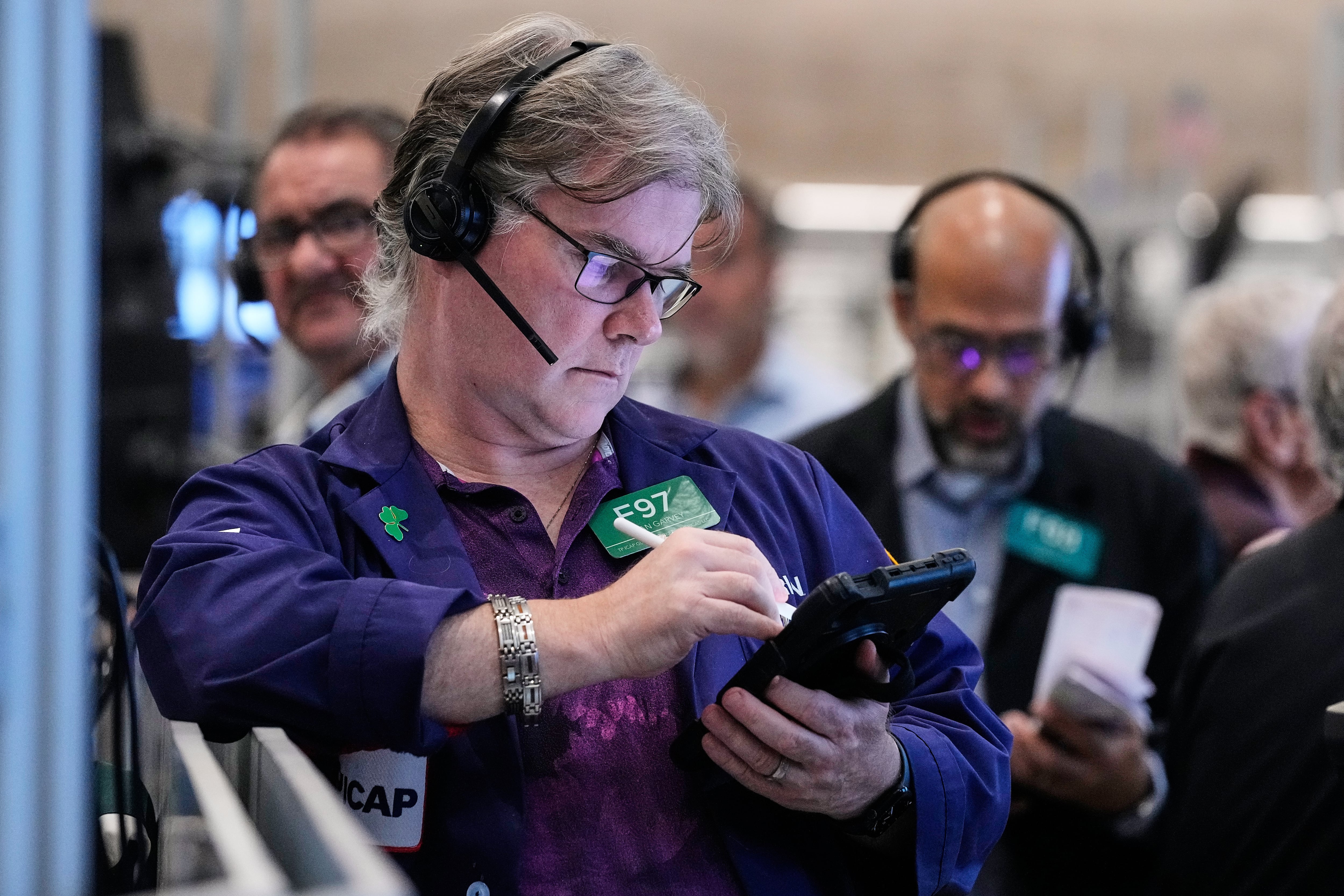NEW YORK (AP) — U.S. stocks are climbing, and the price of oil is tumbling Monday on growing hopes that Iran will not disrupt the global flow of crude, something that would hurt economies worldwide but also its own, following the United States’ bunker-busting entry into its war with Israel.
The S&P 500 was 0.7% higher in afternoon trading, coming off a week where stock prices had jumped up and down on worries about the conflict potentially escalating. The Dow Jones Industrial Average was up 269 points, or 0.6%, as of 2 p.m. Eastern time, and the Nasdaq composite was 0.8% higher.
The price of oil did jump 4% shortly after trading began Sunday night, a signal of rising worries as investors got their first chance to react to the U.S. bombings. But it quickly erased all those gains and swung to a sharp loss as the focus shifted from what the U.S. military did to how Iran would react.
By Monday afternoon, the price of a barrel of benchmark U.S. oil was down 6.1% at $69.34. Brent crude, the international standard, dropped 5.3% to $71.50 per barrel. That brought oil prices nearly back to where they were before the fighting began over a week ago, when a barrel of U.S. crude was just above $68.
The losses accelerated sharply Monday after Iran announced a missile attack on Al Udeid Air Base in Qatar, which the U.S. military uses. Iran said it matched the number of bombs dropped by the United States on Iranian nuclear sites this past weekend, which could be a potential signal of a desire to deescalate the conflict.
Perhaps most importantly for financial markets, that retaliation did not seem to target the flow of oil. The fear throughout the Israel-Iran war has been that it could squeeze the world’s supply of oil, which would pump up prices for it, gasoline and other products refined from crude.
Iran is a major producer of crude, and it could also try to block the Strait of Hormuz off its coast, through which 20% of the world’s daily oil needs passes on ships.
Several analysts said Iran would likely not close the waterway because Iran itself uses the strait to move its own crude, mostly to China, and it needs the revenue made from such sales of oil.
“It’s a scorched earth possibility, a Sherman-burning-Atlanta move,” said Tom Kloza, chief market analyst at Turner Mason & Co. “It’s not probable.”
Neil Newman, managing director of Atris Advisory Japan, said hope remains that the Israel-Iran war could be a short conflict, with the thinking being “the one big hit by the Americans will be effective and then we’ll get back to sort of business as usual, in which case there is no need for an immediate, panicky type of reaction.”
Of course, not everyone is sure about Iran’s next move.
Andy Lipow, a Houston analyst covering oil markets for 45 years, said countries are not always rational actors and that he wouldn’t be surprised if Tehran lashed out for political or emotional reasons.
“If the Strait of Hormuz was completely shut down, oil prices would rise to $120 to $130 a barrel,” said Lipow, predicting that that would translate to about $4.50 a gallon at the pump and hurt consumers in other ways.
“It would mean higher prices for all those goods transported by truck, and it would be more difficult for the Fed to lower interest rates.”
The Federal Reserve has been hesitant to lower interest rates this year because it’s waiting to see how much President Donald Trump’s tariffs will hurt the economy and raise inflation.
Inflation has remained relatively tame recently, but a rise in oil and gasoline prices would put upward pressure on it. That in turn could keep the Fed on hold because cuts to rates can fan inflation higher, along with giving the economy a boost.
A preliminary report on Monday suggested tariffs are pushing up prices for U.S. businesses, whose overall activity is growing by more than economists expected. The data from the survey “corroborate speculation that the Fed will remain on hold for some time,” according to Chris Williamson, chief business economist at S&P Global Market Intelligence.
In the bond market, Treasury yields eased after Fed Gov. Michelle Bowman said she would support cutting rates at the Fed’s next meeting in just a month, as long as “inflation pressures remain contained.”
The yield on the 10-year Treasury fell to 4.30% from 4.38% late Friday. The two-year Treasury yield, which more closely tracks expectations for the Fed, dropped to 3.82% from 3.90%.
On Wall Street, Elon Musk’s Tesla was the single strongest force pushing the S&P 500 higher after jumping 9.4%. The electric-vehicle company began a test run on Sunday of a small squad of self-driving cabs in Austin, Texas. It’s something that Musk has long been touting and integral to Tesla’s stock price being as high as it is.
Hims & Hers Health tumbled 32.3% after Novo Nordisk said it will no longer work with the company to sell its popular Wegovy obesity drug. Novo Nordisk’s stock that trades in the United States fell 5.7%.
In stock markets abroad, indexes fell modestly across Europe after finishing mixed in Asia. France’s CAC 40 sank 0.7%, and Hong Kong’s Hang Seng rose 0.7% for two of the world’s bigger moves.
___
Kurtenbach contributed from Bangkok. AP video journalist Mayuko Ono in Tokyo and AP Business Writer Matt Ott in Washington contributed.









